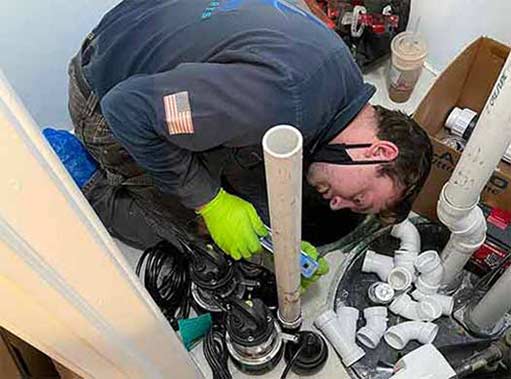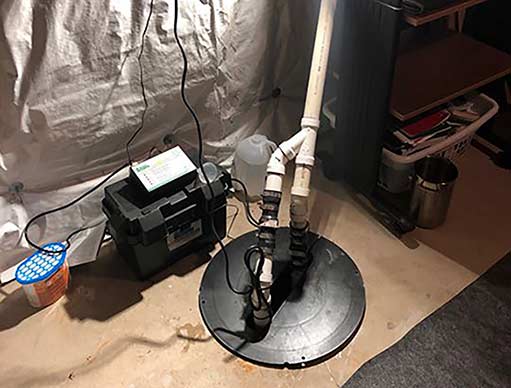Basement flooding can be a nightmare for homeowners, causing extensive damage to property and leading to costly repairs. If you live in Hickory Hills, IL, where heavy rainfall and high water tables are common, taking preventive measures to protect your basement is essential. One of the most effective ways to prevent basement flooding is through the strategic installation of a sump pump.
The Importance of Basement Flooding Prevention
Understanding why basement flooding prevention is crucial can help homeowners in Hickory Hills, make informed decisions about protecting their properties. Basement flooding can occur for several reasons, including heavy rain, melting snow, or plumbing issues. When water seeps into the basement, it can lead to mold growth, structural damage, and damage to valuable belongings stored in the basement.
By investing in a sump pump and ensuring its proper installation, homeowners can significantly reduce the risk of basement flooding. A sump pump is a device that sits in a specially constructed pit, often referred to as a sump basin, in the basement. Its primary function is to pump out excess water and redirect it away from the foundation, preventing water from entering the basement.
Choosing the Right Sump Pump for Your Basement
When it comes to choosing the right sump pump for your basement in Hickory Hills, several factors need to be considered. The type of sump pump, its pumping capacity, and the reliability of the pump are all critical factors to ensure optimum protection against basement flooding.
There are two main types of sump pumps: submersible and pedestal. Submersible sump pumps are designed to be placed inside the sump basin and are generally more expensive. However, they are more efficient, quieter, and less prone to clogging. Pedestal sump pumps, on the other hand, are installed above the sump basin and are generally more affordable. However, they can be noisier and may require more frequent maintenance.
In addition to choosing the right type of sump pump, considering the pumping capacity is crucial. The pumping capacity, often expressed in gallons per hour or minutes, indicates how much water the sump pump can handle. It’s important to choose a sump pump with a pumping capacity that matches the potential water intrusion in your basement to ensure efficient flood prevention.
Reliability is another crucial factor to consider when selecting a sump pump. You want a sump pump that will work reliably during power outages, heavy rainfall, or other instances that may lead to basement flooding. Look for sump pumps with battery backup systems or alternative power sources to ensure continuous operation even in adverse conditions.

Hiring a Professional for Sump Pump Installation
Sump pump installation is a complex process that requires expertise and knowledge. While some homeowners may opt for a DIY approach, it is highly recommended to hire a professional for sump pump installation in Hickory Hills. A local plumber in Hickory Hills will ensure that the sump pump is correctly placed, the discharge pipes are properly connected and directed away from the foundation, and the entire system is functioning optimally.
Professional sump pump installers are experienced in assessing the specific needs of your basement and can recommend the most suitable sump pump for your property. They can also provide valuable guidance on maintenance and potential upgrades to enhance the longevity of your sump pump system.
Maintaining Your Sump Pump for Long-Term Effectiveness
Once your sump pump is installed, regular maintenance is essential to ensure its long-term effectiveness in preventing basement flooding. Here are some essential maintenance tips to keep in mind:
- Test your sump pump regularly: It is recommended to test your sump pump at least once every few months to ensure it’s in proper working condition. You can do this by pouring water into the sump pit and observing the pump’s operation.
- Clean the sump pit: Over time, debris and sediment may accumulate in the sump pit, potentially affecting the pump’s efficiency. Regularly cleaning the sump pit can help prevent clogs and ensure smooth operation.
- Check and clean the discharge pipe: The discharge pipe is responsible for redirecting water away from the foundation. Regularly inspect and clean the discharge pipe to prevent blockages and ensure proper water flow.
- Replace worn out parts: Like any mechanical device, sump pumps may require occasional replacement of parts due to wear and tear. Regularly inspect your sump pump and replace any worn out or damaged components to maintain its optimal functionality.
- Consider a battery backup system: Power outages often coincide with heavy rainfall, increasing the risk of basement flooding. Investing in a battery backup system for your sump pump can provide an additional layer of protection during power outages.
Basement flooding prevention should be a top priority for homeowners in Hickory Hills. The strategic installation of a sump pump is a proven and effective method to prevent basement flooding and protect your property from water damage. By choosing the right sump pump, relying on professional installation, and implementing regular maintenance practices, homeowners can safeguard their basements and enjoy peace of mind, even during heavy rainfall or adverse weather conditions.
—
Having sump pump issues in the Hickory Hills, IL area? We can help! Contact us today at 708-801-6530 or by form below:
[gravityform id=”1″]


